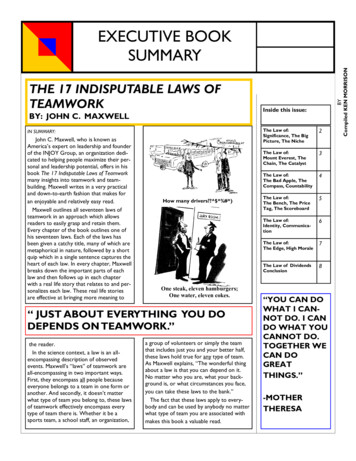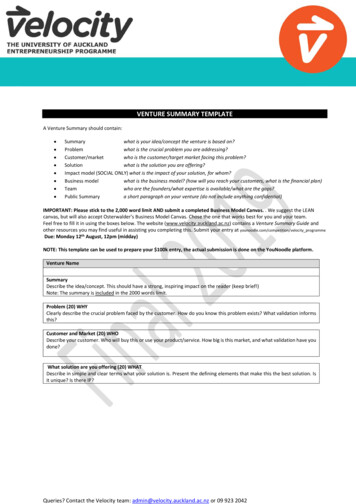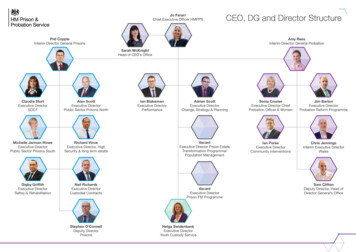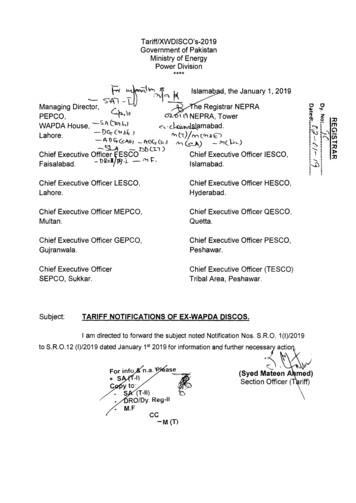
Transcription
THE 17 INDISPUTABLE LAWS OFTEAMWORKBY: JOHN C. MAXWELLIN SUMMARY:John C. Maxwell, who is known asAmerica’s expert on leadership and founderof the INJOY Group, an organization dedicated to helping people maximize their personal and leadership potential, offers in hisbook The 17 Indisputable Laws of Teamworkmany insights into teamwork and teambuilding. Maxwell writes in a very practicaland down-to-earth fashion that makes foran enjoyable and relatively easy read.Maxwell outlines all seventeen laws ofteamwork in an approach which allowsreaders to easily grasp and retain them.Every chapter of the book outlines one ofhis seventeen laws. Each of the laws hasbeen given a catchy title, many of which aremetaphorical in nature, followed by a shortquip which in a single sentence captures theheart of each law. In every chapter, Maxwellbreaks down the important parts of eachlaw and then follows up in each chapterwith a real life story that relates to and personalizes each law. These real life storiesare effective at bringing more meaning toHow many drivers? %# )One steak, eleven hamburgers;One water, eleven cokes.“ JUST ABOUT EVERYTHING YOU DODEPENDS ON TEAMWORK.”the reader.In the science context, a law is an allencompassing description of observedevents. Maxwell’s “laws” of teamwork areall-encompassing in two important ways.First, they encompass all people becauseeveryone belongs to a team in one form oranother. And secondly, it doesn’t matterwhat type of team you belong to, these lawsof teamwork effectively encompass everytype of team there is. Whether it be asports team, a school staff, an organization,a group of volunteers or simply the teamthat includes just you and your better half,these laws hold true for any type of team.As Maxwell explains, “The wonderful thingabout a law is that you can depend on it.No matter who you are, what your background is, or what circumstances you face,you can take these laws to the bank.”The fact that these laws apply to everybody and can be used by anybody no matterwhat type of team you are associated withmakes this book a valuable read.Inside this issue:The Law of:Significance, The BigPicture, The Niche2The Law of:Mount Everest, TheChain, The Catalyst3The Law of:The Bad Apple, TheCompass, Countability4The Law of:The Bench, The PriceTag, The Scoreboard5The Law of:Identity, Communication6The Law of:The Edge, High Morale7The Law of DividendsConclusion8“YOU CAN DOWHAT I CANNOT DO. I CANDO WHAT YOUCANNOT DO.TOGETHER WECAN DOGREATTHINGS.”-MOTHERTHERESABYCompiled KEN MORRISONEXECUTIVE BOOKSUMMARY
How many drivers? %# )THE LAW OF SIGNIFICANCEOne Is Too Small a Number to Achieve SuccessThe Value Of Teamwork:Why Do We Stand Alone?1) Ego- it marks a big step in your developmentYou cannot do anything of real value alone.when you come to realize that other people canWhy Teams Are Important:help you do a better job than you could do alone.Teams involve more people.2) Insecurity - some individuals fail to promoteTeams maximize a leader’s potential.teamwork because they feel threatened by otherpeople.Teams provide multiple perspectives.3) Naivete - some people naively underestimateTeams share credit for victories and blamethe difficulty of achieving big things.for losses.Teams keep leaders accountable for the goal. 4) Temperament - some people are not veryoutgoing and simply do not think in terms ofTeams can simply do more than an individualteam building and team participation.THE LAW OF THE BIG PICTUREThe Goal Is More Important Than the RoleWhat’s In It For Me?People tend to lose sight of the big picture. Infact, some people seem to believe that they arethe entire picture; everything revolves aroundtheir needs, their goals and their desires.What’s Up With Big Picture Teams?It’s All About The TeamWinning teams have players who put the good ofthe team ahead of themselves.3)Seeing The Big PictureEvery person on a team has a role to play. Goodleaders continually keep the vision of the bigpicture before themselves and their people.1)2)Look Up at the Big Picture - everything startswith vision –you need to have a goal.Size Up the Situation - see large tasks as largeopportunities.Line Up Needed Resources4) Call Up the Right Players5) Give Up Personal Agendas - what’s best for therest ?6) Step Up to a Higher Level - achieving somethinggreater than yourself.THE LAW OF THE NICHE All Players Have APlace Where They Add The Most ValueGreat things happen when all the players on theteam take the roles that maximize their strengths their talent, skill and experience.When People Are In The Wrong PlaceWrong person in the wrong place RegressionWrong person in the right place FrustrationRight person in the wrong place ConfusionRight person in the right place ProgressionRight person in the right place MultiplicationPut People In Their Place1) You Must Know the Team - know the team’svision, purpose, culture or history.2) You Must Know the Situation - know wherethe team is and what the situation requires.3) You Must Know the Player - evaluate skills,experience, attitude, passion, potential, discipline and emotional strength of players.Start By Finding the Right Place For YouTo find your niche: Be secure, Get to know yourself, Trust your leader, See the big picture, Relyon your experience.Page 2The belief that oneperson can dosomething great isa myth.If a team is to reachits potential, eachplayer must be willingto subordinate hispersonal goals for thegood of the team.“ There are noproblems we cannot solve together, and veryfew that we cansolve by ourselves.”- Lyndon JohnsonIf you thinkyou are theentire picture,you will neversee the bigpicture.When you discover yourplace, you willsay, “ There’sno place likethis place anywhere near thisplace, so thismust be theplace.”
How many drivers? %# )THE LAW OF MOUNT EVEREST As the ChallengeEscalates, the Need For Teamwork ElevatesWhat’s Your Everest?1) What Is My Dream? - Nothing much happenswithout a dream.2) Who Is On My Team? - Your potential is onlyas good as your current team.3) What Should My Dream Team Look Like? It’s better to have a great team with a weakdream than a great dream with a weak team.Focus On the Team Not the Dream - thechallenge determines the kind of team you need tobuildChanging Challenge .Fast, Flexible TeamLong-term Challenge .Determined TeamDiversified Challenge Complementary TeamEverest-sized Challenge Experienced TeamHow To Grow A TeamDevelop Team MembersAdd Key Team MembersChange the LeadershipRemove Ineffective MembersNew Challenge .Creative TeamControversial Challenge .United TeamPage 3Your Team MustBe The Size OfYour Dream !When the team you havedoesn’t match up to theteam of your dreams,then you have twochoices: Give up yourdream or grow up yourteam.The challengeof the momentoften determinesthe leader forthat challenge.Unpleasant Challenge .Motivated TeamTHE LAW OF THE CHAIN The Strength of theTeam Is Impacted by It’s Weakest LinkYour Team Is Not For Everyone1) Not Everyone Will Take The Journey - somepeople don’t want to change, grow or conquer new territory.2) Not Everyone Should Take The Journey some people have different plans or agendasand where you’re going isn’t the right placefor them.3)Not Everyone Can Take The Journey- they can’t keep pace- they don’t grow in their area ofresponsibility- they don’t see the big picture- they won’t work on personal weakness- they won’t work with the rest of the team- they can’t fulfill expectations for their areaThe Impact of a Weak Link1) The Stronger Members Identify the WeakOne2) The Stronger Members Have to Help theWeak One3) The Stronger Members Come To Resent theWeak One4) The Stronger Members Become Less Effective5) The Stronger Members Question theLeader’s AbilityYou lose therespect of thebest when youdon’t dealwith theworst.Catalysts are getit-done-and-then-some peopleCatalysts are notconsultants.THE LAW OF THE CATALYSTThey don’t recWinning Teams Have Players Who Make Things Happen ommend acourse of action.Characteristics Of A CatalystThree Kinds of Players1) Intuitive6) Initiating1) People Who Don’t Want the BallThey take re2) Communicative7) Responsible3)Passionate8)Generous2) People Who Want the Ball But Shouldn’tsponsibility for4) Talented9) Influential3) People Who Want the Ball and Should5) Creativemaking it happen.
How many drivers? %# )THE LAW OF THE BAD APPLERotten Attitudes Ruin A TeamThe following 5 truths about attitudes clarify howthey affect a team and teamwork:1) Attitudes Have the Power to Lift Up orTear Down a Team3) Bad Attitudes Compound Faster ThanGood Ones4) Attitudes Are Subjective, So IdentifyingA Wrong One Can Be DifficultSomeone with a bad attitude may not doAbilities Attitudes Resultsanything illegal or unethical but his attitudeGreat Talent Rotten Attitudes Bad Teammay be ruining the team just the same. SomeGreat Talent Bad Attitude Average Team common rotten attitudes that ruin a team are:- an inability to admit wrongdoingGreat Talent Average Attitude Good Team- failure to forgiveGreat Talent Good Attitude Great Team- petty jealousy2) An Attitude Compounds When Exposed- the disease of meTo Others- a critical spirit- a desire to hog all the creditSeveral things on a team are not contagious. Talent. Experience. Willingness to practice. But you5) Rotten Attitudes, Left Alone, Ruincan be sure of one thing: Attitude is catching.EverythingTHE LAW OF THE COMPASSVision Gives Team Members Direction and ConfidenceCheck Your Compass !A team should examine the following 6 “compasses”before embarking on any journey:1) A Moral Compass ( Look Above) - it helps allteammates to check their motives and makesure they are laboring for the right reasons. Itbrings integrity to the vision.2) An Intuitive Compass ( Look Within) - the truefire of passion and conviction comes only fromwithin.3) A Historical Compass ( Look Behind) - itshould make use of anything contributed by4)5)6)Page 4Talent is not enough tobring success to ateam. Good attitudesamong players do notguarantee a team’s success, but bad attitudesguarantee its failure.There’s only one thingmore contagious than agood attitude– and that’sa bad attitude.Most badattitudesare a resultof selfishness.Great vision precedes greatachievement.previous teams in the organization.A Directional Compass ( Look Ahead ) - visionprovides direction for the team. Part of that direction comes from a sense of purpose and another comes from having goals, which bring targets to the vision.Vision without strategy is little morethan a daydream.A Strategic Compass ( Look Around ) - a goalwon’t do a team much good without steps toaccomplish itA Visionary Compass ( Look Beyond) - gettingpeople to reach their potential means challengingthem.“ You must have a longrange vision to keep youfrom being frustrated byshort-range failures.- Charles NobleTHE LAW OF COUNTABILITY Teammates Must BeAble To Count On Each Other When It CountsCountability is the ability and de- The Formula For Countability:1) Character - countability begins with charsire for teammates to work toacter because it is based on trust; if you cannotgether toward common goals.trust someone, you will not count on him.Team members who can depend on 2) Competence3) Commitmenteach other only during the easy4) Consistencytimes have not developed count5) Cohesion - the ability to hold together noability. It’s being able to have faith inmatter how difficult the circumstances.your teammates no matter whatbecome.happens.“ We don’t work for eachother, we work witheach other.” - Stanley C.GaultThere is no substitute forcharacter. You can buybrains, but you cannotbuy character. -R.CookThere’s an old saying whenit comes to teams: Eitherwe’re pulling together orwe’re pulling apart.
How many drivers? %# )THE LAW OF THE BENCHGreat Teams Have Great DepthThe Bench Is IndispensableReasons to honor and develop the players who may notbe considered starters:1) Today’s Bench Players May Be Tomorrow’sStars2) The Success of a Supporting Player Can Multiply the Success of a Starter3) There Are More Bench Players Than Starters4) A Strong Bench Gives the Leader More Options5) The Bench Is Usually Called Upon At CriticalTimes for the Team6) A Bench Player Placed Correctly Will AtTimes Be More Valuable Than a StarterToday’s Actions Build Tomorrow’sTeamThe future of your team can be predicted by3 things:1) Recruitment: Who Is Joining the Team?2)3)Training: Are You Developing the Team?Losses: Who Is Leaving the Team?Phases Of An Organization And Its Revolving DoorA team will always have gains and losses. People are constantly coming into an organizationwhile others leave it. The key to its futuresuccess is gaining a more effective personwith each loss.THE LAW OF THE PRICE TAG The Team Fails toReach Its Potential When It Fails to Pay the PricePrice Points:1)The Price Must Be Paid by Everyone2)The Price Must Be Paid All the TimeSome people mistakenly believe that if they canaccomplish a particular goal, they no longer have togrow. This “destination disease” makes us believethat we can stop working , stop striving, stop payingthe price - yet still reach our potential.3) The Price Increases If The Team WantsTo Improve, Change or Keep WinningThere are really only two kinds of teams whoviolate the law of the price tag: those who don’trealize the price of success, and those whoknow the price but are not willing to pay it.4) The Price Never DecreasesThe Price of Teamwork:1) Sacrifice2) Time Commitment3) Personal Development4) UnselfishnessTHE LAW OF THE SCOREBOARD The Team CanMake Adjustments When It Knows Where It StandsWhy The Scoreboard?1)The Scoreboard Is Essential ToUnderstanding2)The Scoreboard Is Essential ToEvaluationThe scoreboard gives you continual feedback.Growth Change. But when it comes to growth ,change alone is not enough.If you want to become better , you have to changein the right direction. You can only do that if youare able to evaluate yourself and your teammates.3) The Scoreboard Is Essential To DecisionMaking4) The Scoreboard Is Essential ToAdjustingPage 5A great starteralone is simply notenough if a teamwants to go to thehighest level.When a team has agreat bench, the options are almost endless.You cannotsolve tomorrow’s problems with today’s solutions.If everyone doesn’tpay the price to win,then everyone will paythe price by losing.Your team will reach itspotential only if you reachyour potential“There are no victories atbargain prices.”- Dwight D. Eisenhower“When you give yourbest to the world theworld returns the favor”- H. Jackson BrownIf a team is to accomplishits goals it has to knowwhere it stands.The scoreboard provides a snapshot ofthe game at anygiven time.
How many drivers? %# )THE LAW OF IDENTITYShared Values Define The TeamDefining The Team:We’ve all seen teams that have a common goal yetlack common values. Everyone on the team hasdifferent ideas about what’s important. The result ischaos. If everyone tries to do things his own waythe team breaks down.The Value of Values Shared values are like:1)2)3)Glue - values hold people together.A Foundation - values provide a stable foundation which makes performing well andgrowth possible.A Ruler - values help set the standard for theteams performance; values are often expressedin a mission statement.4)A Compass - when individuals embrace strongvalues, they possess a moral compass that helpsthem make decisions.5) A Magnet - a team’s values attract people withlike values to the team.6) An Identity - values define the team and give ita unique identity.Values Add
Jun 17, 2015 · John C. Maxwell, who is known as America’s expert on leadership and founder of the INJOY Group, an organization dedi-cated to helping people maximize their per-sonal and leadership potential, offers in his book The 17 Indisputable Laws of Teamwork many insights into teamwork and team-buil











